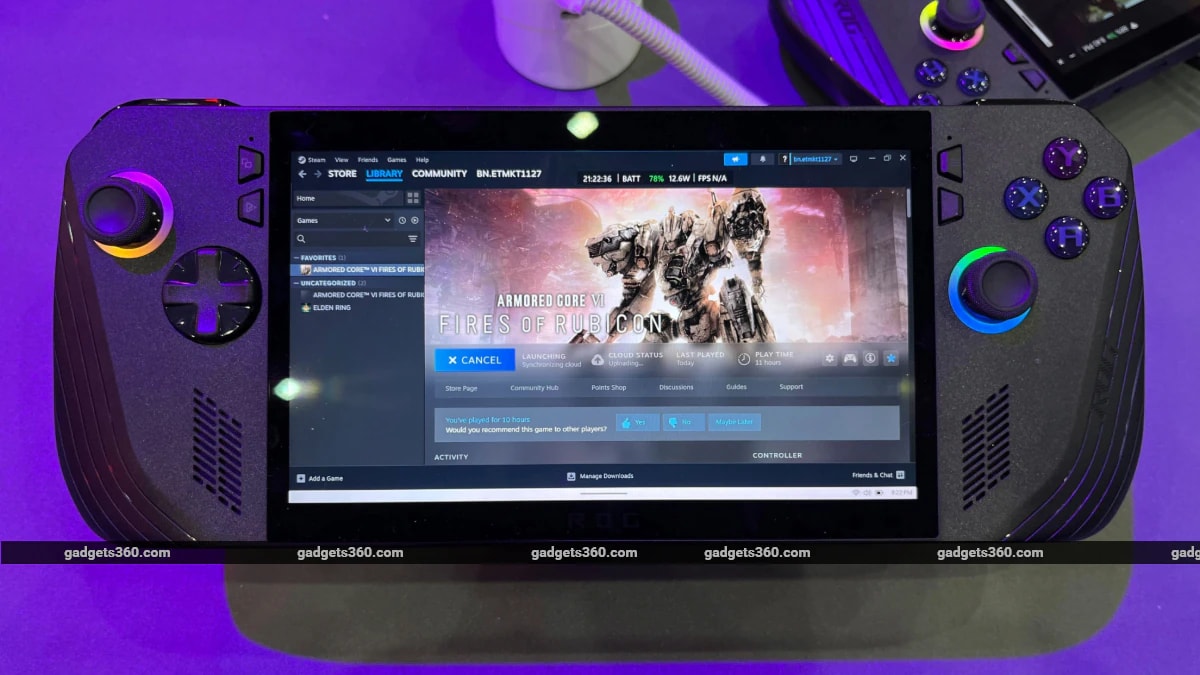
Valve will reportedly support Asus ROG Ally and other rival handhelds with its SteamOS. The company, which sells its own gaming handheld, the Steam Deck, has said that it will allow third-party devices to run its Linux-based operating system. SteamOS, designed and optimised for the “living room experience,” powers the Steam Deck, but most modern gaming handhelds, including the Asus ROG Ally, run on Windows. While Microsoft’s operating system provides flexibility and wider support for third-party game launchers, Windows-based handhelds have faced criticism over their less-than-ideal OS experience.
SteamOS Support for Other Handhelds
The company confirmed its plans to The Verge, saying that it intends to bring SteamOS support to Asus ROG Ally and other Windows-based handhelds. Currently, rival handhelds can run the Steam desktop app on Windows.
Recently, release notes for SteamOS 3.6.9 Beta mentioned ” Added support for extra ROG Ally keys,” leading people to speculate over SteamOS support for the device. Valve has now confirmed that it’s working on the same.
“The note about ROG Ally keys is related to third-party device support for SteamOS. The team is continuing to work on adding support for additional handhelds on SteamOS,” Valve designer Lawrence Yang told The Verge. This means Windows-based handhelds like Asus ROG Ally, Lenovo Legion Go and MSI Claw could get support for SteamOS in the future.
It doesn’t, however, mean that rival companies will start shipping their handheld gaming PCs running SteamOS out-of-the-box. According to the report, Asus opts for Windows for its handheld as Microsoft ensures that its OS works across devices with different hardware specifications and chipsets, among other reasons.
Windows-Based Handhelds
And while Valve has confirmed that it’s working on SteamOS support for third-party devices, don’t expect SteamOS to start shipping on other handhelds anytime soon. According to the report, while the company has made “steady progress,” its OS isn’t ready to run out-of-the-box on other devices yet.
Valve’s Steam Deck and Steam Deck OLED models run on SteamOS, which brings a console like interface for the company’s digital games storefront, Steam. The Steam client works on other handhelds through the Windows app, but does not bring the intuitive interface.
The recently launched Asus ROG Ally X running the Steam Windows client
Windows-based handhelds like the ROG Ally get wider support for game launchers like Epic Games Store, Ubisoft Connect and Xbox, but the touch-based Windows OS experience often leaves more to be desired. These devices essentially act as a handheld PC, with constant updates, bugs and bottlenecks associated with the Windows experience being very much present. Meanwhile, the Steam Deck, which also offers a traditional Linux-based PC experience in its Desktop Mode, brings a console-like interface with Steam OS, allowing users to browse and access their Steam libraries smoothly.
SteamOS is Valve’s Linux-based operating system that builds upon Debian OS, optimising it for a console-like “living room” experience, as Valve calls it. The OS comes pre-installed on Steam Deck devices.


